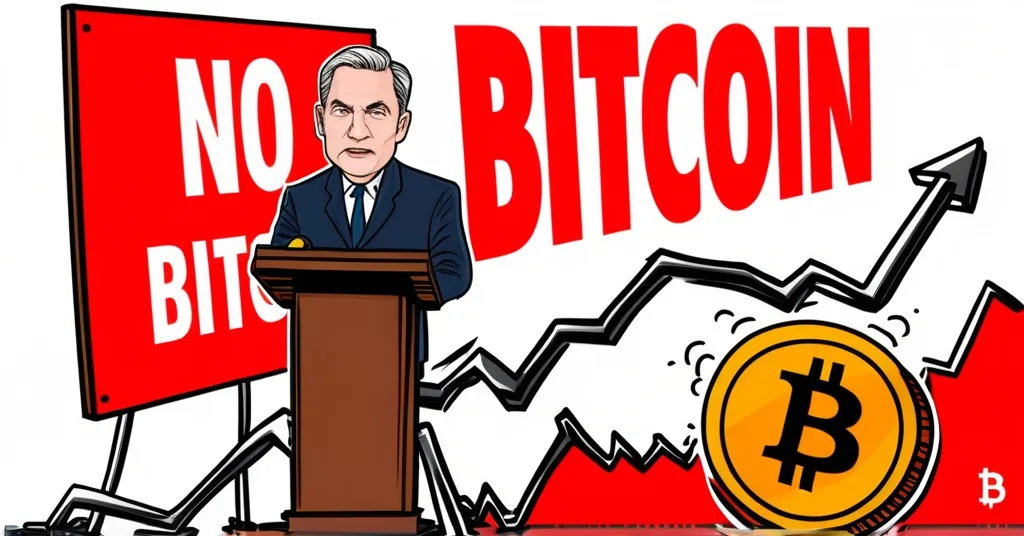Fed Chair Powell Clarifies Bitcoin Bar on Fed’s Balance Sheet, Markets React with 5.7% BTC Drop

Jerome Powell on Why Bitcoin Is Not in the Fed’s Cards
Jerome Powell, Chairman of the Federal Reserve, has firmly stated that the Fed is legally barred from holding Bitcoin. This announcement has doused any speculation about the Fed’s potential involvement in cryptocurrency reserves and sparked a notable reaction in financial markets.
- The Federal Reserve is restricted from owning Bitcoin by the Federal Reserve Act.
- Only Congress has the authority to decide on establishing a U.S. Bitcoin reserve.
- Bitcoin’s price tumbled 5.7% following Powell’s comments.
Legal Framework
During a recent address, Powell was clear: “We’re not allowed to own Bitcoin. The Federal Reserve Act says what we can own, and we’re not looking for a law change. That’s something for Congress to decide, not the Fed.” This clarification comes amid a backdrop of increasing discussions among lawmakers, including figures like President-elect Donald Trump and U.S. Senator Cynthia Lummis, who have shown support for a government-held Bitcoin reserve. However, any move towards such a reserve would require legislative action, emphasizing the role of Congress over the Federal Reserve in such matters.
The Federal Reserve Act, a cornerstone of U.S. monetary policy, outlines the assets the Fed is permitted to hold, limiting its direct involvement with digital currencies unless Congress decides otherwise. Such potential amendments would require rigorous debate and consensus in a legislative environment often resistant to rapid change, further underscoring the complexities involved in integrating cryptocurrencies into national reserves.
Market Impact
The market’s response was swift, reflecting both the potential and the volatility inherent in cryptocurrencies. Bitcoin experienced a notable 5.7% decline, trading at $100,740. Other digital currencies mirrored this downward trend, with Ethereum dropping by 6.8%, Binance Coin by 4.6%, Solana by 8.1%, and Dogecoin experiencing an 11% nosedive. The ripple effect extended beyond the crypto sector, affecting traditional markets as well. The S&P 500 and Nasdaq 100 indices fell by 1.55% and 2%, respectively.
This sharp market reaction underscores the sensitivity of cryptocurrencies to policy statements and regulatory positions. Investors are keenly aware of the potential risks and rewards associated with digital currencies, often reacting to any signals that could indicate future regulatory shifts. The broader market’s decline further highlights the interconnectedness of traditional and digital financial systems, emphasizing the growing influence of cryptocurrency sentiment on established markets.
Future Implications
As Bitcoin’s status as a potential strategic asset gains traction, conversations around national reserves become increasingly significant. Yet, without legislative changes, the Federal Reserve remains confined within its current mandate. The prospects for a U.S. Bitcoin reserve hinge on Congressional willingness to navigate the legal and regulatory landscape, which remains a challenging and uncertain path.
Powell’s comments serve as a reminder of the hurdles that cryptocurrencies face in gaining mainstream financial acceptance. The ongoing debate around digital currency integration will likely continue to shape discussions on national financial strategies, as lawmakers and financial authorities grapple with the evolving economic landscape.
Key Takeaways for Readers:
- Understand the legal limitations and regulatory challenges surrounding national cryptocurrency adoption.
- Acknowledge the impact of policy statements on both cryptocurrency and traditional markets.
- Consider how potential legislative changes could transform the landscape for digital currencies.
Expert opinions suggest that while Powell’s statement has temporarily dampened enthusiasm for a U.S. Bitcoin reserve, it has also ignited deeper discussions about the role of digital currencies in future economic models. The historical reluctance of central banks to fully embrace cryptocurrencies adds another layer to the ongoing dialogue, making it a crucial topic for both policymakers and crypto enthusiasts to monitor closely.



